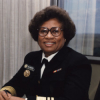Joycelyn Elders

Joycelyn Elders
Minnie Joycelyn Eldersis an American pediatrician and public health administrator. She was a vice admiral in the Public Health Service Commissioned Corps and the first African American appointed as Surgeon General of the United States. Elders is best known for her frank discussion of her views on controversial issues such as drug legalization and distributing contraception in schools. She was fired in December 1994 amidst controversy as a result of her views. She is currently a professor emerita of pediatrics...
NationalityAmerican
ProfessionDoctor
Date of Birth13 August 1933
CountryUnited States of America
Nobody with a criminal record would ever be allowed to buy a gun. All assault weapons would be banned, completely. And everybody who still possesses a gun license would receive mandatory education and training by professionals on how to handle a gun. After all, I can't drive my car until I pass a test proving I know how to handle a car.
[We must] deal with all of the contributing factors to gun violence as a whole, because it's like a leaky bucket - if you've got a bucket with six holes shot through it, [and] you plug up five, you've still got a leaky bucket.
I've pretty much always used my positions as a bully pulpit. What that means is strongly advocating for the things I feel are really important. Gun violence, to me, is the highest-priority public-health issue, and I have to make sure Congress is aware of it, the American people are aware of it, the president is aware of it, and that we all begin together to develop policies to exterminate the disease - the epidemic, really - of gun violence.
Certainly we have to find some kind of warning to put on guns for sale. And that's not too far-fetched. But what I really want to do is take the guns out of the hands of irresponsible people.
Guns are far too accessible and too readily available. There are over 200 million guns in our society - and that's just the legal ones, the ones we know about. Every ten seconds, another gun is produced. And every fourteen minutes, some person in America dies from gun-inflicted action.
I don't know how anybody can say that who looks at what's happening to our young people and what's happening to our country, all because of guns. The NRA is putting themselves in a position where people will no longer trust them. They've been trusted in the past, but now their credibility is on the line.
My biggest challenge is to educate the American people, to make access to health care available for all, and to make sure that prevention plays a big part in health care. In the case of guns, prevention means we prevent homicides and devastating, expensive gun injuries by preventing those who shouldn't have guns from getting their hands on guns.
I support a total ban on handgun ownership for anyone under eighteen. Uzis should be absolutely banned from entering this country. Automatic weapons of any kind should not be for sale in America. For that matter, toy Uzis should not be available for kids, either. There would be a minimum seven-day waiting period between applying for a gun permit and obtaining a gun.
I want to make it as hard as possible. Gun owners would have to be evaluated by how they scored on written and firing tests, and have to pass the tests in order to own a gun. And I would tax the guns, bullets and the license itself very heavily.
We know that there are several predisposing factors to gun violence: poverty, lack of education, lack of good parenting, lack of jobs, living in an environment where violence is seen every day, all the time. And children being born to children are likely to have all of these predisposing factors.
Homicide, often involving guns, is a disease that is the leading cause of death for young black men, and the second-leading cause of death for all people aged fifteen to twenty-four. That makes it the leading health issue, particularly when guns are used in combination with drugs and alcohol. And the statistics show that is most often the case.
It is often easier for our children to obtain a gun than it is to find a good school.
Our country talked about masturbation more in December of 1994 than they ever have in the history of the country, and you know, people would think you'd be embarrassed about that. I'm not embarrassed about that.
I went to Washington, not to get that job but to do that job. I wanted to do something about the problems that I saw out there that were happening in our country. I wanted to do something to make sure that all people had access to health care. I wanted to do something to reduce teenage pregnancies and begin to address the needs of our adolescents.